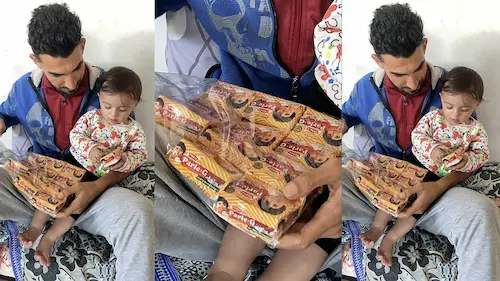
Discover why Parle-G biscuits are selling for Rs 2,300 in Gaza amid severe food shortages
Parle-G, India’s beloved biscuit known for its affordability, has shockingly become a luxury item in war-torn Gaza. A viral video recently surfaced showing a Palestinian father handing his daughter a packet of Parle-G, revealing that he had purchased it for an astonishing Rs 2,300. This staggering price hike is a direct consequence of the ongoing Israel-Palestine conflict, which has led to severe food shortages and disrupted supply chains.
The Viral Video That Shook the Internet
On June 6, Mohammed Jawad, a resident of Gaza, shared a heart-wrenching video on X (formerly Twitter). In the clip, he is seen giving his daughter, Rafif, a packet of Parle-G, her favorite biscuit. Jawad captioned the video:
“After a long wait, I finally got Rafif her favorite biscuits today. Even though the price jumped from €1.5 to over €24, I just couldn’t deny Rafif her favorite treat.”
The video quickly went viral, sparking global outrage and sympathy. Many social media users expressed shock at the exorbitant price of a biscuit that typically costs around Rs 100 in international markets.
Why Is Parle-G So Expensive in Gaza?
The price surge of Parle-G biscuits in Gaza is primarily due to the following factors:
1. Food Shortages and Blockades
Since the escalation of hostilities in October 2023, Gaza has faced a near-total blockade. Between March and May 2025, only a limited number of humanitarian aid trucks were allowed into the region, following intense international pressure. This blockade has severely restricted access to essential goods, including food items.
2. Black Market Exploitation
Reports indicate that humanitarian aid entering Gaza is often diverted to the black market, where it is sold at exorbitant prices. Dr. Khaled Alshawwa, a surgeon in Gaza City, explained that food aid meant for civilians is frequently stolen and resold at inflated rates. This has led to a situation where even staple items like flour and sugar are unaffordable.
3. Disrupted Supply Chains
The ongoing conflict has crippled Gaza’s import channels, making it nearly impossible to bring in food supplies through conventional means. As a result, the few available items are sold at astronomical prices.
Social Media Reactions and Calls for Aid
The viral video of Rafif receiving her favorite biscuit has triggered widespread calls for humanitarian intervention. Many users have urged the Indian government to send more food aid to Palestine. One user tagged India’s External Affairs Minister, saying:
“The baby is eating India’s favorite biscuit. Can we please send more Parle-G to Palestine? These glucose biscuits will help relieve the civilian population.”
Others expressed their heartbreak over the situation, with one commenting:
“Rafif deserves all the biscuits she desires. Stay safe, family.”
The Bigger Picture: Gaza’s Worsening Food Crisis
The Parle-G price hike is just one example of the broader humanitarian crisis unfolding in Gaza. Reports indicate that essential commodities have seen staggering price increases:
- Flour: Rs 41,000 per sack
- Sugar: Rs 5,000 per kg
- Potatoes: Rs 2,000 per kg
The United Nations and international relief agencies have repeatedly warned of famine-like conditions in Gaza, with malnutrition rates soaring and access to clean water, medicine, and food shrinking by the day.
Conclusion – Parle-G Biscuit Cost
The shocking price of Parle-G biscuits in Gaza is a stark reminder of the devastating impact of war on civilians. As food shortages worsen, urgent international intervention is needed to ensure that essential supplies reach those in need. The viral video of Rafif’s father struggling to buy a simple biscuit for his daughter underscores the dire humanitarian crisis gripping Gaza.
Stay updated with the latest news on Rapido Updates. Keep yourself updated with The World, India News, Entertainment, Market, Gadgets, Sports, and many more.
1 thought on “Parle-G Biscuit Costs Rs 2,300 in Gaza Amid Food Crisis, Here’s Why”